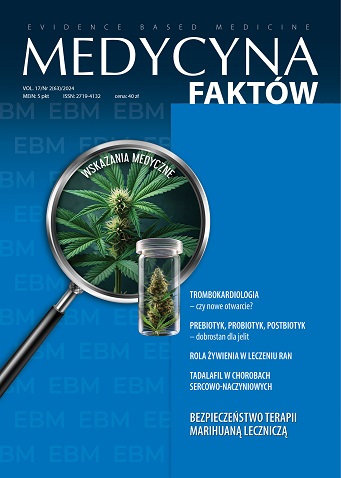Lewodropropizyna ? czy skład leku ma znaczenie? Artykuł przeglądowy
##plugins.themes.bootstrap3.article.main##
Abstrakt
Kaszel jest najczęstszym objawem chorób układu oddechowego, a odruch kaszlowy jednym z podstawowych fizjologicznych mechanizmów ułatwiających oczyszczanie dróg oddechowych. Wskazania do stosowania leków przeciwkaszlowych są ograniczone i dotyczą wyłącznie suchego, uporczywego kaszlu. Jednak badania pokazują, że stosowanie leków przeciwkaszlowych jest skuteczne. Wśród leków przeciwkaszlowych szczególne miejsce zajmuje lewodropropizyna. Jest nieopioidowym środkiem przeciwkaszlowym, działającym obwodowo. Metaanalizy udowodniły skuteczność zarówno u dzieci, jak i dorosłych, wykazując statystycznie istotnie lepsze wyniki w porównaniu z lekami przeciwkaszlowymi działającymi ośrodkowo pod względem skuteczności w zmniejszaniu intensywności kaszlu, jego częstości i nocnych wybudzeń. Cechy, jakie powinien mieć idealny lek dla dzieci to: skuteczność, bezpieczeństwo, doświadczenie ze stosowaniem preparatu, postać odpowiednia do wieku i możliwości pacjenta, precyzyjnie określone dawkowanie, brak zawartości cukru w syropie oraz alkoholu i barwników, dobry smak i prosty sposób dawkowania. Jest taki preparat.
##plugins.themes.bootstrap3.article.details##
Copyright © by Medical Education. All rights reserved.
Bibliografia
2. Doniec Z, Mastalerz-Migas A, Krenke K et al. Rekomendacje postępowania diagnostyczno-terapeutycznego w kaszlu u dzieci dla lekarzy POZ. Lekarz POZ. 2016; 2(4): 305-21.
3. Malesker MA, Callahan-Lyon P, Ireland B, Irwin RS. Pharmacologic and Nonpharmacologic Treatment for Acute Cough Associated With the Common Cold: CHEST Expert Panel Report. Chest. 2017; 152(5): 1021-37.
4. Birring S, de Blasio F, Dicpinigaitis PV et al. Antitussive therapy: A role for levodropropizine. Pulm Pharmacol Ther. 2019 Jun; 56: 79-85.
5. Mannini C, Lavorini F, Zanasi A et al. A Randomized Clinical Trial Comparing the Effects of Antitussive Agents on Respiratory Center Output in Patients With Chronic Cough. CHEST 2017; 151(6): 1288-94.
6. Zanasi A, Lanata L, Fontana G et al. Levodropropizine for treating cough in adult and children: a meta-analysis of published studies. Multidiscip Respir Med. 2015; 10(1): 19.
7. Muśko M, Sznitowska M. Postacie leków pediatrycznych. Część I. Wymagania i podstawowe problemy ? dawkowanie, połykanie, smak. Farm Pol. 2010; 66(3): 215-20.
